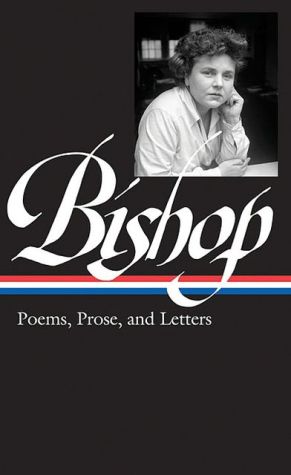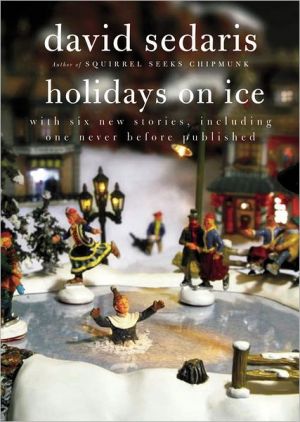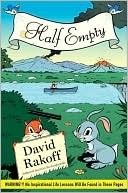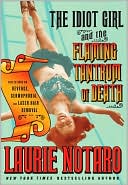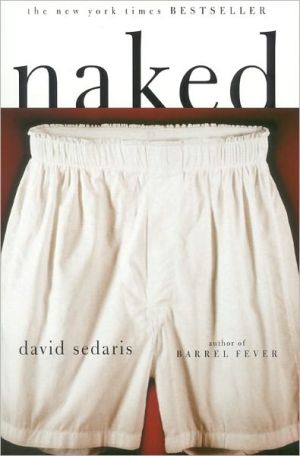Elizabeth Bishop: Poems, Prose and Letters
Robert Giroux and Lloyd Schwartz, editors \ James Merrill described Elizabeth Bishop's poems as "more wryly radiant, more touching, more unaffectedly intelligent than any written in our lifetime" and called her "our greatest national treasure." Robert Lowell said, "I enjoy her poems more than anybody else's." Long before a wider public was aware of Bishop's work, her fellow poets expressed astonished admiration of her formal rigor, fiercely observant eye, emotional intimacy, and sometimes...
Search in google:
Robert Giroux and Lloyd Schwartz, editors James Merrill described Elizabeth Bishop's poems as "more wryly radiant, more touching, more unaffectedly intelligent than any written in our lifetime" and called her "our greatest national treasure." Robert Lowell said, "I enjoy her poems more than anybody else's." Long before a wider public was aware of Bishop's work, her fellow poets expressed astonished admiration of her formal rigor, fiercely observant eye, emotional intimacy, and sometimes eccentric flights of imagination. Today she is recognized as one of America's great poets of the 20th century. This unprecedented collection offers a full-scale presentation of a writer of startling originality, at once passionate and reticent, adventurous and perfectionist. It presents all the poetry that Bishop published in her lifetime, in such classic volumes as North & South, A Cold Spring, Questions of Travel, and Geography III. In addition it contains an extensive selection of un_published poems and drafts of poems (several not previously collected), as well as all her published poetic translations, ranging from a chorus from Aristophanes' The Birds to versions of Brazilian sambas. Poems, Prose, and Letters brings together as well most of her published prose writings, including stories; reminiscences; travel writing about the places (Nova Scotia, Florida, Brazil) that so profoundly marked her poetry; and literary essays and statements, including a number of pieces published here for the first time. The book is rounded out with a selection of Bishop's irresistibly engaging and self-revelatory letters. Of the 53 letters included here, written between 1933 and 1979, a considerable number are printed for the first time, and all are presented in their entirety. Their recipients include Robert Lowell, Marianne Moore, Randall Jarrell, Anne Stevenson, May Swenson, and Carlos Drummond de Andrade.The Barnes & Noble ReviewElizabeth Bishop published fewer than 100 poems throughout her life, yet her influence on other poets is wide and deep. John Ashbery dubbed her "a poet's poet's poet." She is -- after Emily Dickinson, perhaps -- our most important American female poet, and it's not absolutely clear she is ours. Bishop was born in Nova Scotia and spent the happiest years of her tumultuous childhood in Canada (she was virtually orphaned by the age of five), before being whisked off to New England "civilization" by her paternal grandparents. She lived an international life, chiefly in Brazil but also Europe, Manhattan, and Key West. The voluminous Bishop: Poems, Prose, and Letters weighs in at nearly 1,000 pages. Bishop published only four books of poetry, roughly one each decade. Her self-assessment was characteristically modest. "I have written, so far, what I feel is a rather 'precious' kind of poetry, although I am very much opposed to the precious. One wishes things were different, that one could begin all over again."
\ Publishers WeeklyNo further proof is necessary to show that Bishop-still not widely known beyond literary circles at the time of her death in 1979-has, posthumously in the last three decades, become one of America's most popular 20th-century poets, but this hefty and handsome volume from the Library of America certainly clinches the deal. Between its covers one can find most of the perfectionist author's oeuvre, more than enough to confirm Bishop as a master at revealing the complexity of simple, often painful things ("I said to myself: three days/ and you'll be seven years old./ I was saying it to stop/ the sensation of falling off the round, turning world/ into cold, blue-black space./ But I felt: you are an I, you are an Elizabeth"). All the poems gathered in the now-classic Collected Poemsare here, as are the unpublished drafts released in 2006's controversial Edgar Allen Poe and the Jukebox. The memoir and fiction pieces of Collected Proseare also reprinted, along with a few other pieces of scattered nonfiction, as well as a generous selection of Bishop's enthralling letters. Bishop's work is deeply compassionate and necessary reading, and now almost all of it can be found in one place. (Feb)\ Copyright 2007 Reed Business Information\ \ \ \ \ Library JournalThis mammoth volume sports all of Bishop's published works as well as many unpublished poems along with translations, correspondence, travel writing, literary essays, and more. An entire Bishop library between two covers for a reasonable price.\ \ —Michael Rogers\ \ \ The Barnes & Noble ReviewElizabeth Bishop published fewer than 100 poems throughout her life, yet her influence on other poets is wide and deep. John Ashbery dubbed her "a poet's poet's poet." She is -- after Emily Dickinson, perhaps -- our most important American female poet, and it's not absolutely clear she is ours. Bishop was born in Nova Scotia and spent the happiest years of her tumultuous childhood in Canada (she was virtually orphaned by the age of five), before being whisked off to New England "civilization" by her paternal grandparents. She lived an international life, chiefly in Brazil but also Europe, Manhattan, and Key West. The voluminous Bishop: Poems, Prose, and Letters weighs in at nearly 1,000 pages. Bishop published only four books of poetry, roughly one each decade. Her self-assessment was characteristically modest. "I have written, so far, what I feel is a rather 'precious' kind of poetry, although I am very much opposed to the precious. One wishes things were different, that one could begin all over again." \ This generous volume includes all four published books of verse, as well as unpublished poems, many of which appeared in Edgar Allan Poe & The Juke-Box: Uncollected Poems, Drafts, and Fragments (2007). The unpublished poems unearth moments of great beauty, though one can nearly always see why Bishop, the consummate artist, considered them unfinished or unready. There's a sampling of Bishop's many fine translations, ranging from Aristophanes to Brazilian poets Carlos Drummond de Andrade and Joaquin Cardozo.\ Bishop also contains more than 400 pages of prose: essays, introductions, stories, reviews, memoir, et al., plus a selection of Bishop's voluminous correspondence -- notably to her closest poet-friends, Marianne Moore and Robert "Cal" Lowell.\ Bishop has long occupied a place of honor among the confessional poets, a position she would likely have resisted. She is a most impersonal personal poet. Her poetry is indelibly marked by reticence and self-control. She was a formal poet who wrestled with rhyme and meter. She also kept her poetry private; her most passionate love poems -- and most explicitly homosexual love poems -- reside in her unpublished work. As she wrote to a young poet, " Of course I am hopelessly old-fashioned and perhaps I don't like things expressed so openly and nakedly...."\ Bishop's genius lies in her strong, clear, vibrant expression of emotions and observations. Yet it remains both reserved and clothed. Her formalism served as another form of "clothing" for the naked emotion in her work. Consider the last half of her famous villanelle, "One Art":\ I lost my mother's watch. And look! my last, or next-to-last, of three-loved houses went.\ The art of losing isn't hard to master. \ I lost two cities, lovely ones. And, vaster,\ some realms I owned, two rivers, a continent.\ I miss them, but it wasn't a disaster.\ --Even losing you (the joking voice, a gesture I love) I shan't have lied. It's evident the art of losing's not too hard to master though it may look like (Write it!) like disaster.\ \ The parenthetical (Write it!) is violently wrenched from the poet, as if against her will. Bishop's work hovers between reserve and agonized expression -- her poems sing like high-tension strings. \ One cannot overlook the beauty in her language, evident in her use of colors, for instance. Bishop painted, and her work has a watercolorist's soft brilliance:\ The battered houses, rows of brick,\ are clear as quartz, the color thins to amethyst, -- the chimney-pots...\ Bishop is the forerunner of poets like Jane Kenyon and Mary Oliver in her loving exactitude about the world, her attention to detail. A sandpiper "runs, he runs to the south, finical, awkward, / in a state of controlled panic, a student of Blake." Maxine Kumin owes her formal genius, Marie Howe her intimately spoken voice, to Elizabeth Bishop. \ Bishop also embraced life's homely, sad underbelly. In "Filling Station" she looks closely, with all her senses acutely alive, at the interior of an old Esso gas station.\ Somebody embroidered the doily.\ Somebody waters the plant,\ or oils it, maybe. Somebody arranges the rows of cans so that they softly say ESSO-SO-SO-SO to high-strung automobiles.\ Somebody loves us all.\ Her letters sketch queer and poignant characters with a few flashing strokes of the pen. ("I've always loved the stories of Shelley going around Oxford peering into baby-carriages, and how he once said to a woman carrying a baby, 'Madame, can your baby tell us anything of pre-existence?' " But some of her best effects shine from her reminiscences of early childhood in Nova Scotia. Here we find precision, elegance, toughness, acuity, and humor. "In the Village" recounts the story of a midnight fire during that brief interim when she lived with her mother, grandparents, and aunts. (Bishop's father died when she was a baby, and her mother was institutionalized when Elizabeth was four or five -- they never saw each other again.) \ This same village fire recurs in the unpublished "A Drunkard," one of the most vibrant poems in the collection. Its condensation of the fire, its compression into a form that uncoils and dances, urges us to see her poetic genius. The story shines under enormous poetic pressure into a diamond-like brilliance:\ I picked up a woman's long black cotton stocking. Curiosity. My mother said sharply Put that down! I remember clearly, clearly -- \ But since that night, that day, that reprimand I have suffered from abnormal thirst --\ I swear it's true -- and by the age of twenty or twenty-one I had begun to drink, & drink -- I can't get enough and, as you must have noticed,\ I'm half-drunk now....\ And all I'm telling you may be a lie....\ \ Despite an odd layout in regard to the order of its sections (poems first, biography last), Bishop is a handsome shiny black brick of a book, meticulously indexed, with an almost biblical feel. Surely it deserves and will find its place on every poetry bookshelf, public or private. --Liz Rosenberg\ Liz Rosenberg is a professor of English at SUNY Binghamton and a regular contributor on books to The Boston Globe.\ \ \
